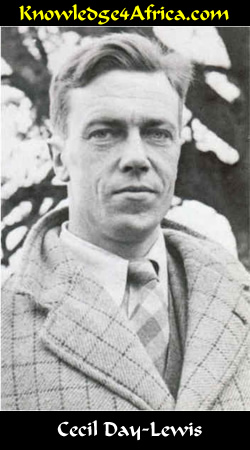|
READ THIS
The poet remembers an incident which took place some 18 years earlier when his son, Sean, left him to
join a group of friends at school.
The incident was perfectly natural -- it happens to every parent -- but it reverberated down the years so
that, almost two decades later, the poet still remembered the event as clearly as the day on which it
happened.
 NOTE ON THE POET
NOTE ON THE POET
Cecil Day-Lewis was of Irish descent, having been born in Ballintubbert in County Laois, the son of a
clergyman and his wife.
He was just two years old, however, when his mother died, at which point his father moved to London
where the young child did all his schooling. He eventually graduated from Oxford University in 1927.
Despite this prolonged English education, he always regarded himself as Anglo-Irish although, when
Ireland eventually gained independence from Britain, he chose British citizenship rather than Irish.
He began work as a school teacher, then later became involved in the publishing industry before
eventually taking up a lecturing post at Cambridge University. Later he accepted a Professorship in Poetry
at Oxford before transferring to Harvard University in the United States.
For a while -- just before the outbreak of World War II -- he joined the communist party, during which
time his poetry took on a distinctly socialist flavour. Disillusion soon set in, however, and he parted
company with the socialists.
Day-Lewis had a troubled marital life, being married first to Mary King and then to Jill Balcon. These two
marriages resulted in five children. He also had several extra-marital affairs during which he probably
fathered a further two children.
He was appointed Poet Laureate of Britain in 1968 but died from pancreatic cancer just four years later.
He was then 68 years of age.
Have you looked at the questions
in the right column?
|
TEST YOURSELF!
Read the left column and then answer
the following questions:
"With the pathos of a half-fledged thing set free
Into a wilderness."
- What is meant by "pathos"? (2)

[Need help?]
"Pathos" is defined as "the power that comes from an actual life experience" or something
that we might learn from literature.
|
- What image does the poet conjure up when he describes his son as "a half-fledged thing set free
into a wilderness"? (4)

[Need help?]
The poet looks at the image of nature to find parallels for what has happened with his son. The
"half-fledged thing" in the wilderness is quite naturally set free. Indeed, birds quite often push their
chicks out of the nest.
In this, humans are very different. We are inclined to cling and not want our children to leave the nest.
Even when they do at last depart, many parents still often try to rule their lives from far instead of letting
them go completely.
|
- In what way can the school be said to be "a wilderness"? (2)

[Need help?]
We'll ignore the temptation to speak of feral schoolkids!
For the child of school-going age, everything is new and even dangerous -- indeed, a wilderness. The
other schoolkids, the teachers, the principal -- all represent threats in various ways. And, like a
wilderness, it is all something that has to be explored and conquered.
|
"The gait of one
Who finds no path where the path should be."

[Need help?]
A "gait" is described as "a manner of walking, stepping, or running".
|
- What do we learn about the son's "gait" in these two lines? (4)

[Need help?]
There appears to be a hesitancy, doesn't there? The boy is used to having his life organised for him,
knows perfectly the "path" in his life which is one of safety.
Here, however, there are no paths and no guidance. The boy will just follow his new friends -- but they
are not even friends as yet. So his gait is hesitant and uncertain.
|
- Why should the son find "no path where the path should be"? (4)

[Need help?]
This question has probably already been answered.
At home, the boy had organisation, had people to show him what to do, where to go, how to do things.
There were clearly defined paths for him to follow.
As with all children, of course, he had probably attempted to explore the wilderness of his own home, to
push the boundaries to see how far they stretched. By now, however, he was fairly confident of which
paths to follow.
Yet now he was in a new situation and with no parent to guide him. It was a wilderness with no
immediately discernible paths to follow. He would have to start from fresh and find those paths.
|
"That hesitant figure, eddying away
Like a winged seed loosened from its parent stem."
- Why would the boy be "hesitant"? (2)

[Need help?]
Any child would be hesitant to leave its parents for the first time. It is all new to him and children naturally
shy clear from the dangers of too much novelty, preferring the safety of the known.
|
- Is it really the boy who is hesitant, or is it the poet who is projecting his own feelings onto his
son? (2)

[Need help?]
It could be either. Nevertheless, the fact that the child is suddenly away from the paths he knows so well
would indeed make him very hesitant.
|
- What image of the son is conjured by the words "eddying away"? (4)

[Need help?]
"Eddying away" has the connotation of drifting, floating on the wind, being carried gently on the slow
currents of a stream. The "winged seed loosened from its parent stem" will float hither and thither
on the wind with no clear objective.
|
|



